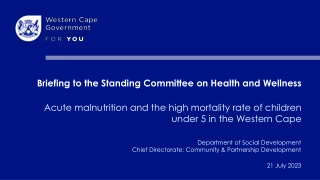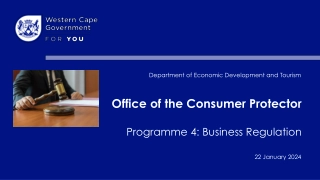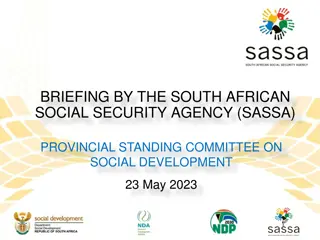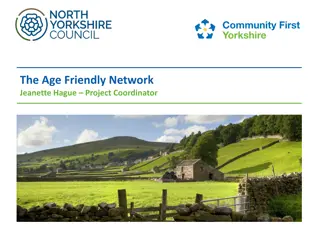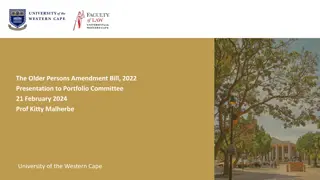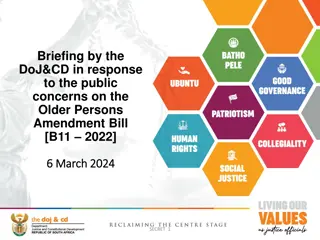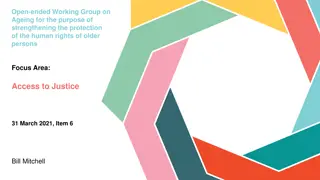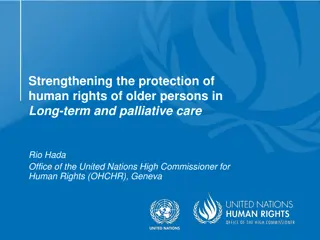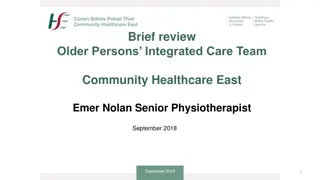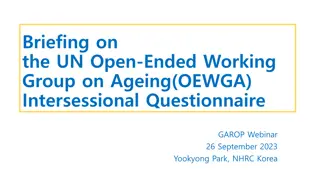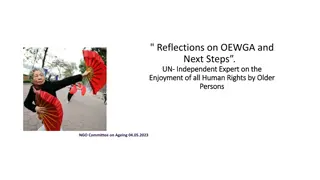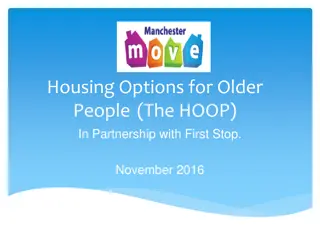Age-in-Action - Empowering Older Persons in the Western Cape
Age-in-Action is a developmental organization based in the Western Cape, dedicated to upholding the rights and dignity of older persons through advocacy, care services, training, and economic empowerment. With offices in Cape Town, George, and Lambert's Bay, they offer professional social work services, operate a Care-Line for elder protection, and provide training programs on elder abuse. Despite challenges like COVID-19, the organization continues to make a positive impact on the lives of older individuals in the region.
Download Presentation

Please find below an Image/Link to download the presentation.
The content on the website is provided AS IS for your information and personal use only. It may not be sold, licensed, or shared on other websites without obtaining consent from the author. Download presentation by click this link. If you encounter any issues during the download, it is possible that the publisher has removed the file from their server.
E N D
Presentation Transcript
WESTERN CAPE 18 LOWER BURG STREET 3RDFLOOR BOLAND BANK BUILDING CAPE TOWN, 8000 Tel.: 021 423 0204 EMAIL: irene@age-in-action.co.za WEBSITE: www.age-in-action.co.za PRESENTED BY: MRS. IRENE SNELL-CARROLL CARE-LINE: 0800 333 231 PROVINCIAL DIRECTOR
MISSION Age-in-Action is a developmental organisation which strives, in collaboration with other stakeholders, to uphold the rights and dignity of older persons, through advocacy and lobbying and improved access to care; support and protection; training and development; and sustainable economic empowerment.
CONTENT OF THIS PRESENTATION AREA OF OPERATION / OFFICES/ STAFF SERVICE DELIVERY IMPACT OF COVID-19 ON OLDER PERSONS SERVICE RENDERED BY ORGANISATION DURING THE PANDEMIC CHALLENGES CONCLUSION
AREA OF OPERATION/OFFICES/STAFF The organisation operates in the whole Western Cape We have 3 offices: a) Cape Town Central; b) George; c) Lambert s bay; We have 14 staff members: a) 2 Supervisors; b) 6 Social Worker; c) 5 Social Auxiliary workers; d) 1 Administrative officer
SERVICE DELIVERY PROFESSIONAL SOCIAL WORK SERVICES PROFESSIONAL SOCIAL WORK SERVICES Provide direct specialised integrated social work services that comply with provision, protocol and minimum standards according to the Older Persons Act of 2006 in order to promote the protection of older persons in the Western Cape. Early identification of older persons at risk; Investigate alleged elder abuse; Counselling; Statutory interventions Placements in residential facilities. Register alleged abuse older persons on the VEPOPAR system. Assisting alleged abused older persons with court proceeding by being a professional witness and moral support for them. Establish an emergency fund and food bank for homeless and destitute older persons. Assistance to legal services.
CARE CARE- -LINE To maintain the older persons Care-line for the protection, prevention of abuse and empowerment of vulnerable older person and ensure service are accessible for older persons. LINE Maintain the toll-free telephone system for older persons where they can call for help specifically focussing on abuse. Promote this service Data capturing of alleged abuse case reported Keep trained staff on line which are able to assist clients Establish legal support network. TRAINING AND EDUCATIONAL PROGRAMMES TRAINING AND EDUCATIONAL PROGRAMMES To provide training and information regarding elder abuse and neglect of older persons to stakeholders, other government departments and older persons in the Western Cape. Provide training of the Older Persons Act 13 of 2006 and Elder Abuse to, communities etc. Support existing organisations in governance Mentor and support emerging organisations Provide educational programme to all older persons in the Western Cape
Identify Older persons at risks by prevention and promotion of activities that meet the needs of vulnerable older persons before they enquire in depth intervention and statutory services. Facilitate and maintain programmes that ensure older persons have an active and independent life. Dissemination of information to families and communities. Intergenerational programmes Programmes that prevent continuous dependency within the family and community.
COVID-19 and OLDER PERSONS: Transition from Crisis to Routine The COVID-19 pandemic has shaken the foundations of lifestyles and everyday routines, particularly for our older people as we collectively learn to live with COVID-19. The virus is not just threatening the lives and safety of older persons, it is also threatening their social networks, their access to health services, their jobs and their pensions. Those who normally receive care at home and in the community an more likely it is more women than men. This pandemic affect all of us but especially the most vulnerable people who already live in poor conditions and survive with the minimal. The fear and the unknown is difficult to deal with because no one knows if there is ever going to be an end to this and older persons struggle to come to terms with the new routine that is enforce on them. Physical distancing is crucial but needs to be accompanied by social support measures and targeted care for older persons, including by increasing their access to digital technologies.
SERVICES DURING LOCKDOWN - PREVENTION OF THE SPREAD OF COVID-19 Providing information about COVID-19 to older persons, re: resources available, home deliveries, essential supplies and measures of preventions; Emergency numbers & support contacts that they need to have at hand. Importance of people should the primary caregiver fall sick; Food parcels & masks where we could; Identify and support older persons living alone; Counselling services was very difficult for both the older persons, social workers and auxiliary workers. However they have to remain professional at all times; Bereavement support; Specific transport just for older persons but it can be very expensive; Cooked lunches for older persons; Elderly Care Drive (Mandela day); Survey - to determine what more we can do to meet their needs.
CHALLENGES 1. Living with the minimum under normal circumstances put a further strain on the most vulnerable. 2. Older persons had to stretch their pension to assist their children who had lost their jobs/working on short time, etc. and still have to pay their normal bills. 3. Communication (language barriers, etc.) and lack of understanding. 4. Low literacy level of some older persons and not to have the capability to assist grandchildren with school work or activities has been challenge. 5. 24 Hour support system for frontline workers has taken its toll on older persons. 6. Older persons cannot come to terms with the lost of their loved ones during the pandemic as they did not have the chance to say farewell. 7. The fear and the unknown is difficult to deal with because no one knows if there is ever going to be an end to this. 8. Technology is a challenge for many older persons who wants to communicate with their children and grandchildren, specifically if they want to see their faces.
Challenges continue. 1. Faith is very important to older persons and the fact that they are not able to worship the way they use to creates a lot of frustration in them. 2. Some are not able to get their chronic medications or can not send somebody to get it for them. 3. Many older persons thrive on social interaction and now being cut off, create the risks of falling into depression and leave them traumatise. 4. The report of elder abuse cases did not spike as significantly as we expected and the reason could be the fear that older persons living 24/7 with the perpetrator and realise they had no where to go and no privacy to talk or the fact that the money was valuable to put food on the table, therefore they have no airtime. 5. Social distancing/self isolation is extremely difficult/or in some case impossible for older persons living in informal settlements and low cost housing which in some cases have 5 and more people living in one bedroom house. 6. People that take advantage of the older persons who are so trustworthy;
CONCLUSION: Older people are frequently overlooked in development and humanitarian strategy development and funding. In the context of Covid-19 and the risk posed to older people, they must be explicitly identified and considered in funding applications and decisions at all levels and in all settings. THANK YOU.



